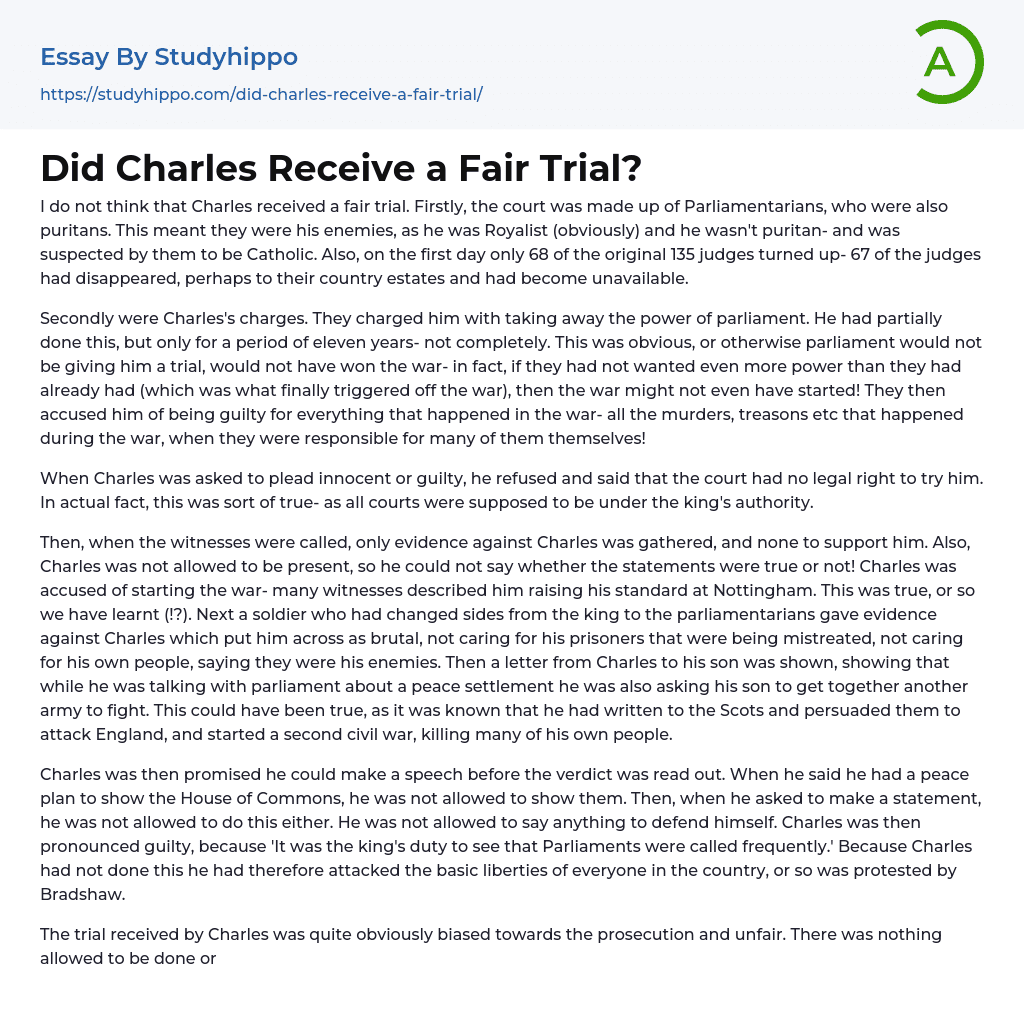I do not think that Charles received a fair trial. Firstly, the court was made up of Parliamentarians, who were also puritans. This meant they were his enemies, as he was Royalist (obviously) and he wasn't puritan- and was suspected by them to be Catholic. Also, on the first day only 68 of the original 135 judges turned up- 67 of the judges had disappeared, perhaps to their country estates and had become unavailable.
Secondly were Charles's charges. They charged him with taking away the power of parliament. He had partially done this, but only for a period of eleven years- not completely. This was obvious, or otherwise parliament would not be giving him a trial, would not have won the war- in fact, if they had not wanted even more power than they had already had (which was wha
...t finally triggered off the war), then the war might not even have started! They then accused him of being guilty for everything that happened in the war- all the murders, treasons etc that happened during the war, when they were responsible for many of them themselves!
When Charles was asked to plead innocent or guilty, he refused and said that the court had no legal right to try him. In actual fact, this was sort of true- as all courts were supposed to be under the king's authority.
Then, when the witnesses were called, only evidence against Charles was gathered, and none to support him. Also, Charles was not allowed to be present, so he could not say whether the statements were true or not! Charles was accused of starting the war- many witnesses described him raising his
standard at Nottingham. This was true, or so we have learnt (!?). Next a soldier who had changed sides from the king to the parliamentarians gave evidence against Charles which put him across as brutal, not caring for his prisoners that were being mistreated, not caring for his own people, saying they were his enemies. Then a letter from Charles to his son was shown, showing that while he was talking with parliament about a peace settlement he was also asking his son to get together another army to fight. This could have been true, as it was known that he had written to the Scots and persuaded them to attack England, and started a second civil war, killing many of his own people.
Charles was then promised he could make a speech before the verdict was read out. When he said he had a peace plan to show the House of Commons, he was not allowed to show them. Then, when he asked to make a statement, he was not allowed to do this either. He was not allowed to say anything to defend himself. Charles was then pronounced guilty, because 'It was the king's duty to see that Parliaments were called frequently.' Because Charles had not done this he had therefore attacked the basic liberties of everyone in the country, or so was protested by Bradshaw.
The trial received by Charles was quite obviously biased towards the prosecution and unfair. There was nothing allowed to be done or said to defend Charles- not even by himself. Only 59 of the 132 judges signed Charles' death warrant, and some had to be forced to do so.
Hardly
any of the trial was fair, although some of the evidence given and perhaps one of accusations made were true. Not much else could be said to be true, or fair anyway.
- John Locke essays
- 9/11 essays
- A Good Teacher essays
- A Healthy Diet essays
- A Modest Proposal essays
- A&P essays
- Academic Achievement essays
- Achievement essays
- Achieving goals essays
- Admission essays
- Advantages And Disadvantages Of Internet essays
- Alcoholic drinks essays
- Ammonia essays
- Analytical essays
- Ancient Olympic Games essays
- APA essays
- Arabian Peninsula essays
- Argument essays
- Argumentative essays
- Art essays
- Atlantic Ocean essays
- Auto-ethnography essays
- Autobiography essays
- Ballad essays
- Batman essays
- Binge Eating essays
- Black Power Movement essays
- Blogger essays
- Body Mass Index essays
- Book I Want a Wife essays
- Boycott essays
- Breastfeeding essays
- Bulimia Nervosa essays
- Business essays
- Business Process essays
- Canterbury essays
- Carbonate essays
- Catalina de Erauso essays
- Cause and Effect essays
- Cesar Chavez essays
- Character Analysis essays
- Chemical Compound essays
- Chemical Element essays
- Chemical Substance essays
- Cherokee essays
- Cherry essays
- Childhood Obesity essays
- Chlorine essays
- Classification essays
- Cognitive Science essays




